
Editor's note: This story is reprinted from pages 8-13 in the August issue of GCU Magazine. To read the digital version of the magazine, click here.
Rick Vacek, Theresa Smith, Lana Sweeten-Shults and Ryan Kryska contributed to this report
Photos by David Kadlubowski
GCU Magazine
The announcement of Grand Canyon University’s transition back to nonprofit status manifested into a celebration of GCU’s accomplishments the last 10 years … of how it got to this point and where it’s going … of the transformation of its campus and its west Phoenix neighborhood. But, most significantly, it was a celebration of what GCU has been able to do and will continue to do for students – students like Nate Carpenter and Noah Wolfe.
The two student leaders were insightful, eloquent and passionate as they spoke to the standing-room-only gathering on the fourth floor of the Student Union. Carpenter, the 2017-18 Associated Students of Grand Canyon University (ASGCU) president and now a University employee, and Wolfe, the new student body president, told the audience how their GCU experiences have helped mold them into curious learners, caring people and charismatic leaders.
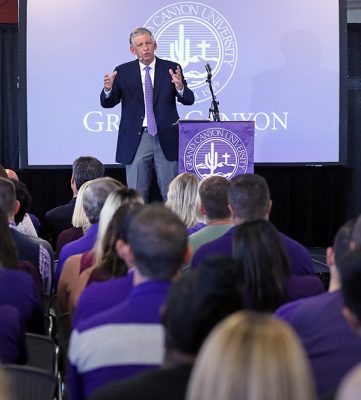
institution for 10 years," he said. "... Number one, we didn’t raise tuition when we could have done it very
easily. ... Secondly, almost every single dollar
of profit made got reinvested into educational
infrastructure.”
Wolfe summed it up well when he said in his speech, “Regardless of our (nonprofit) status, the students are excited because students come first here. This university has proved that time and time again. … I know our student body is excited to pursue finding our purpose as we continue to pioneer the world of private education.”
Brian Mueller, who will continue as President of GCU and CEO and Chairman of the Board for Grand Canyon Education, Inc. (GCE), listed the reasons for the transaction, through which GCE sold GCU for approximately $875 million to a nonprofit entity that will retain the GCU name:
- It puts GCU on a level playing field with other traditional universities with regard to tax status.
- It ensures that GCU students and faculty have the same access to research opportunities and grants as other universities.
- It opens up the world of philanthropic giving to GCU.
- It allows GCU to be a voting member of the NCAA.
- Most importantly, it better enables GCU to continue to freeze tuition, which it has maintained for 10 straight years on the ground campus.
Afterward, Mueller lauded the work of Dan Bachus, Chief Financial Officer, and Brian Roberts, Chief Administrative Officer and General Counsel, and their teams for pulling together a complicated challenge. “This has not been done very many times before and never done exactly like this,” Mueller said.
He added, “We feel good about how we did this, and the for-profit model and public investment, we think, should be rethought. There should be a way to make educational opportunities even greater in this country than they are today and not be so heavily reliant on tax dollars.”
Approximately 35 percent, or 1,400, of full-time employees under the previous GCE flag transferred their employment to GCU along with almost all of GCE’s 6,000 part-time and adjunct employees and student workers. That leaves approximately 2,600 full-time employees working for GCE, which continues to be publicly traded and will be able to outsource its educational services, advanced technologies and expertise to other universities and even Christian high schools.
One thing that will not change: the GCU campus culture. “Our student body, in and of itself, the core of who we are, is not changing,” Carpenter promised the audience.
Another kind of transition
Carpenter was one of only seven students in his graduating class at Trinity Lutheran School in Bend, Ore. He was incredibly successful there – student body president, National Honor Society president and captain of the basketball team – but he did not know a soul when he arrived at GCU.
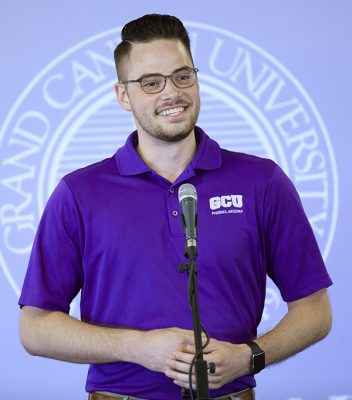
“From Day 1, I just wanted to meet as many people as I could because that’s the best way to hear people’s story and know what their heart is,” Carpenter said.
As a Resident Assistant (R.A.) his sophomore and junior years, his passion for his fellow Lopes grew, leading to his election as ASGCU president. In that role, he emphasized diversity and the expansion of clubs and organizations.
“Students can take what they are passionate about and create something with it and make it flourish (here),” Carpenter said. “That is so unique; it doesn’t take long processes and years to build to get something done. It can take a couple weeks. It might be stressful at times, but it is amazing when it comes to creating opportunities for our students.”
Upon his graduation in April with a degree in business management, Carpenter was hired as a university counselor. He plans to begin a dual master’s program at GCU in January, for Business Administration and Science of Leadership, followed by law school.
Carpenter is a keen-minded mentor to Wolfe, who aspires to be a minister, politician or community developer and relates well to GCU and its volunteer partnerships with west Phoenix, a neighborhood similar to his birthplace in Virginia.
“I was born into an impoverished community, a lot of what this (west Phoenix) community looked like a while ago, and that impacted me,” said Wolfe, who was adopted by two government employees (CIA and NASA) who moved the family to San Diego. Upon graduation from Foothills Christian High School, his life journey continued at GCU.
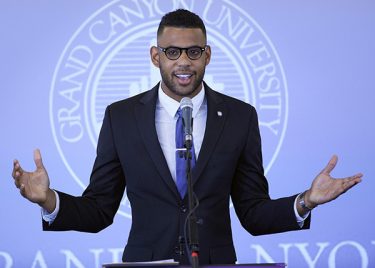
“I think it was crazy for me coming to a new city, coming to a new college, and wondering what it’s going to look like,” he said. “I know there was some time in the early stages of my freshman year where I really asked the question, ‘Is this the place for me?’
“I have phenomenal people in my life, and my parents and my mentors just encouraged me to keep sticking it out, to invest in myself. When I decided to go all in on the opportunities here, that’s when things really turned around.
“This university loving and investing in me really pushed me to turn around and invest in other people. There was a commitment from President Mueller all the way down to invest in students.”
As an R.A., a Discover GCU student worker, a member of the Diversity Council, a community volunteer and now as ASGCU president, Wolfe utilizes his tender heart, galvanizing charm and exemplary speaking skills to lead the Lopes.
“All of those experiences helped me to see first-hand how really special this university is,” Wolfe said.
Research will be under microscope
Researcher Dr. Mike Mobley — his expertise is in spectroscopy and optics — has no problem cranking up the volume when it comes to providing the kinds of life experiences Wolfe referenced.
So it seems apt that Mobley, Executive Director of GCU’s Center for Integrated Science, Engineering and Technology, would be the University’s champion in spearheading its efforts to establish an office to develop grants – research grants included – as well as endowments, donations, philanthropic giving, scholarships and the like as GCU enters a new era as a nonprofit.
The office will administer new sources of income for the University, which didn’t qualify for most grants and similar types of giving in the past because of its for-profit status.
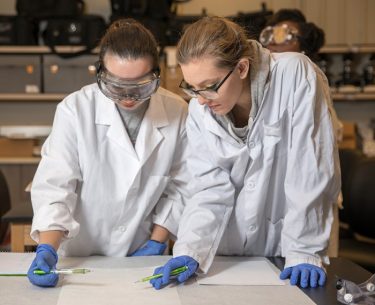
“The issue has been that there are a lot of foundations that support educational initiatives, community service initiatives, health care initiatives, and we’ve been excluded from those opportunities in the past,” Mobley said. “So that’s one major area. The other is in the area of federal grants. A significant portion of those grants are earmarked for nonprofits. So now (as a nonprofit), we’ve become eligible for those.”
The new development office is still being established and the University is close to naming a vice president to oversee it, but Mobley has been quietly and busily working in the background. He has been meeting with the University’s deans to define their strategies and how to leverage the new grant and philanthropic opportunities. He also has been tasked with devising a budget.
His focus, he said, will be on research initiatives – ones that will bring in more equipment to the University, for example, and more research opportunities for students.
GCU touts two major research initiatives, the first of which is the Center for Innovation in Research and Teaching. It focuses on the scholarship of improved teaching and learning outcomes and the presentation and publication of those best practices at academic conferences and scholarly journals throughout the country.
The other program, established just two years ago, is the Research and Design Program. About two dozen projects fall under the RDP umbrella, and about 40 faculty and staff and almost 290 students were engaged in one or more research initiatives in 2017-18. Those projects have been supported by the budget of the College of Science, Engineering and Technology (CSET) but now may find support in these other funding sources.
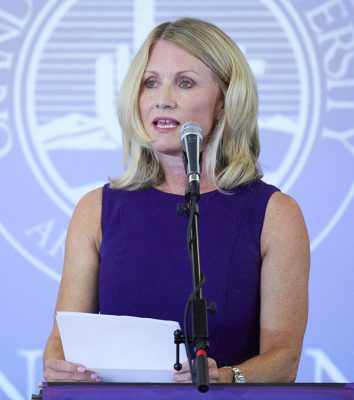
The projects have included:
- Investigating Sonoran desert plants to learn if they tout medicinal properties;
- Researching cyanobacteria to find out if they could be the answer to the world’s dirty fuel problems;
- Creating an anatomical atlas;
- Developing a bandage to help in wound care;
- Measuring whether daily exercise is better than alternating exercise when it comes to lowering blood pressure.
Mobley emphasized that even with these new opportunities for research grants, GCU remains first and foremost, as it has been since it was founded in 1949, a teaching institution. “But we want to supplement that with significant research initiatives,” he said.
So, rather than immediate sweeping changes, expect to see a steady ramp-up in the University’s existing research programs.
“We’ve been on a great ramp-up. This (grant opportunities and the like) will just continue to improve that,” he said. “As we get to be a bigger and bigger university, as you go from 10,000 to 20,000 to 30,000 students, it’s very difficult to think about involving a whole lot of students in research and innovative activities unless you’ve got some sources of funding externally.”
Other opportunities
Outside of research grants for the sciences, Mobley said GCU is looking forward to grant opportunities elsewhere. He noted that many foundations’ charters limit their support to nonprofits, which means GCU’s new status could pave the way for help with community initiatives in the Murphy and Alhambra school districts.
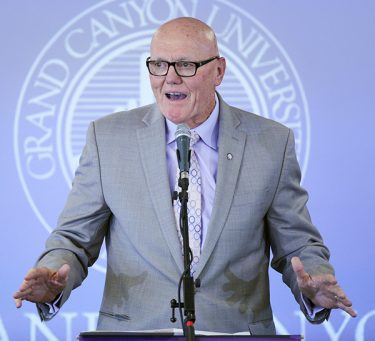
Carpenter also is encouraged by the chance to be able to help the community more with such financial support. He is heartened, he said, by “those opportunities to be able to apply for grants, to be able to make an impact moving forward in the Murphy district, moving forward even further with the Alhambra district, to be able to better those communities, to be able to better the community that surrounds us and give opportunities.”
Jon Valla, a CSET assistant dean, sees chances for GCU to land student training and experience grants, which provide students with the experiences they need to be accepted into graduate or medical school. He also is excited about what the nonprofit transition means in terms of philanthropy.
“We will now be able to accept philanthropic gifts from alumni, parents, relatives and friends of the University,” Valla said. “Providing for equipment and other items that will significantly and directly enhance the experiences and training of future students is often a very attractive target for donors.”
Mobley said all these initiatives, research and otherwise, are again focused on the most important thing to the University: its students. “The heavy focus, unlike a traditional research university, is opportunities for our students,” he said. “That’s the thing that comes first as a teaching university.”
As it always has been and will continue to be, Mueller emphasized. When he arrived at GCU in 2008, the University still was recovering from the shock of facing bankruptcy and nearly closing its doors four years earlier. Asked about his level of excitement then compared to today, he replied:
“It was a combination of excited and scared because there were a lot of challenges. Whether we were going to make it out of the tough times was not absolutely clear. We’re just as excited as we were 10 years ago, but we’re much more confident and sure that this model has staying power.”
And its impetus comes from celebrating students.





















































